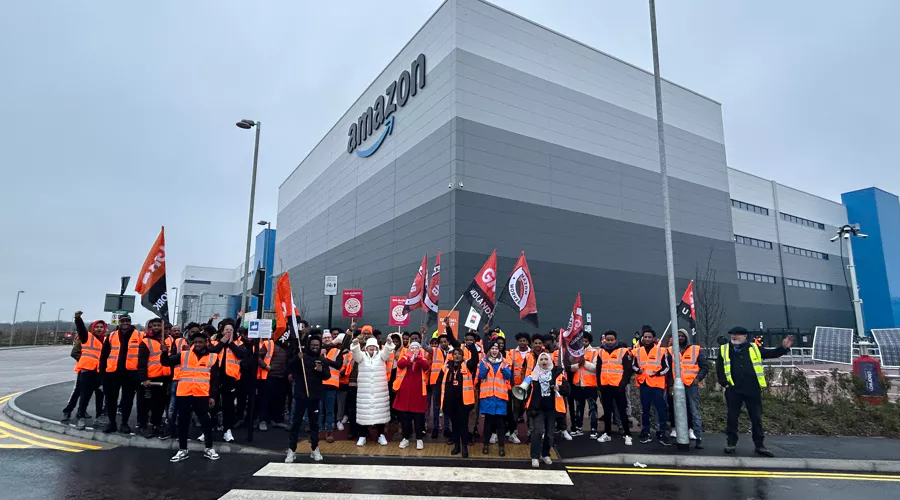Amazon is formally contesting Quebec labour law in response to the first successful unionization of one of its Canadian warehouses. On May 6, just before the accredation of the DTX4 warehouse in Laval, Quebec, Amazon filed a constitutional challenge to the Quebec Labour Code. The dispute will be heard by Quebec's Administrative Labour Tribunal (ALT) on June 10th.
Article 28 of the Quebec Labour Code sets out a union's right to be certified by the province when more than 50% of workers agree to be represented by the union. That majority can be determined either through a vote, or through more than 50% of workers signing a union card.
In a letter to the ALT, Amazon claimed that Article 28 "violates its employees' right to freedom of association by potentially depriving them of the right to choose their representatives". Freedom of association is a right guaranteed by the Canadian Charter of Rights and Freedoms which includes, among other things, the right of workers to join a trade union.
Amazon's relentless approach to defending its union-busting practices is well established. If the e-commerce giant loses its case at the ATL, it is unlikely to let the issue drop and could appeal the matter to higher courts.
If the constitutional challenge ends up before the Supreme Court of Canada, a decision in Amazon's favour there could drastically reinterpret the constitutional right of workers to form trade unions and make it much more difficult for unions to be accredited.
Amazon has retained the lawyer Corrado de Stefano, a union-busting expert who has previously represented companies like Walmart, Couche-Tard, McGill University and CN Rail as they faced off against unions.

The Quebec case bears similarities to another legal dispute in the United States. In February of this year, Amazon responded to complaints about its union-busting tactics in Staten Island, New York by arguing that that the National Labor Relations Board (NLRB) itself is unconstitutional.
The NLRB is the U.S. equivalent of Quebec's ALT and of the tribunals dealing with labour law in other provinces, such as the OLRB in Ontario.
Amazon is not the first American company to defend itself from worker complaints by attacking the NLRB on constitutional grounds. Over the last few months, Elon Musk-owned SpaceX, café giant Starbucks and upscale grocery chain Trader Joe's have raised similar arguments while defending themselves against accusations that they use illegal union-busting tactics.
In the U.S., Amazon has retained the Seyfarth Shaw law firm, which has specialized in union busting for nearly a century. In the 1940s, Seyfarth Shaw's lawyers drafted the Taft–Hartley Act, an American federal law that severely restricts unions' ability to strike, picket and prevent scabbing.
American unions criticized the Taft–Hartley Act at the time of its inception as a "slave-labour bill". It is still in effect today.
Amazon's complaints against the NLRB have the potential to rise through the American legal system all the way to the Supreme Court.
If the retail monopoly has its way, the NLRB will be stripped of its power to enforce American labour law. Unions would be forced to use regular courts to handle labour law violations, which could cost them a great deal more money and time than they would spend in the current system.
At the moment, the legal and political climate of the U.S. is very favourable to bosses when it comes to overturning workers' rights. The U.S. Supreme Court is more pro-business than it has been in over a century, providing an ideal climate for monopolies like Amazon to overturn decades' worth of American labour protections.
Caroline Senneville, president of the Confédération des syndicats nationaux (CSN), the union representing Amazon workers in Laval, affirmed her union's rejection of American-style union busting.
"We've seen it from the start: Amazon has never wanted to respect the legal framework governing labor relations in Quebec. [...] It's not true that an American multinational is going to come and dictate our laws."
- “We’ve taken on a giant”
- Film review—”Union” lets the organizing process speak for itself
- Victory for Amazon workers at Quebec’s labour tribunal
- Laval Amazon Workers Turn Up the Heat
- Surprise show of force by Amazon workers in Laval
- Court dismisses “outlandish” Amazon constitutional challenge
- Laval Amazon workers protest for a fair salary
- Amazon Peak Season Kills
- Amazon delivery drivers walk off due to extreme cold
- Amazon’s no-holds-barred legal assault on unions comes to Quebec
- Amazon Workers Keep Getting Poorer
- UK Workers take on Amazon
- Amazon hires 1300 workers to bust British union
- UK Amazon workers voting on union recognition
- Two steps forward, one step back for Unifor at Amazon fulfilment centres
- Amazon workers in Quebec ready to form historic union
- Amazon at war with the Labour Code following Quebec union certification
- Amazon pours millions into union-busting meetings
- Amazon buys time at Quebec’s labour tribunal


